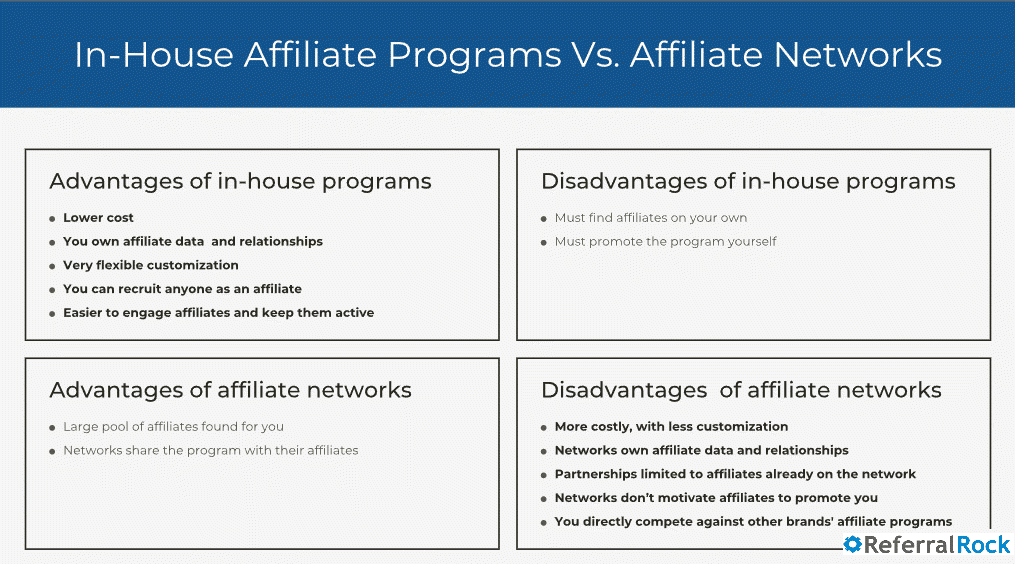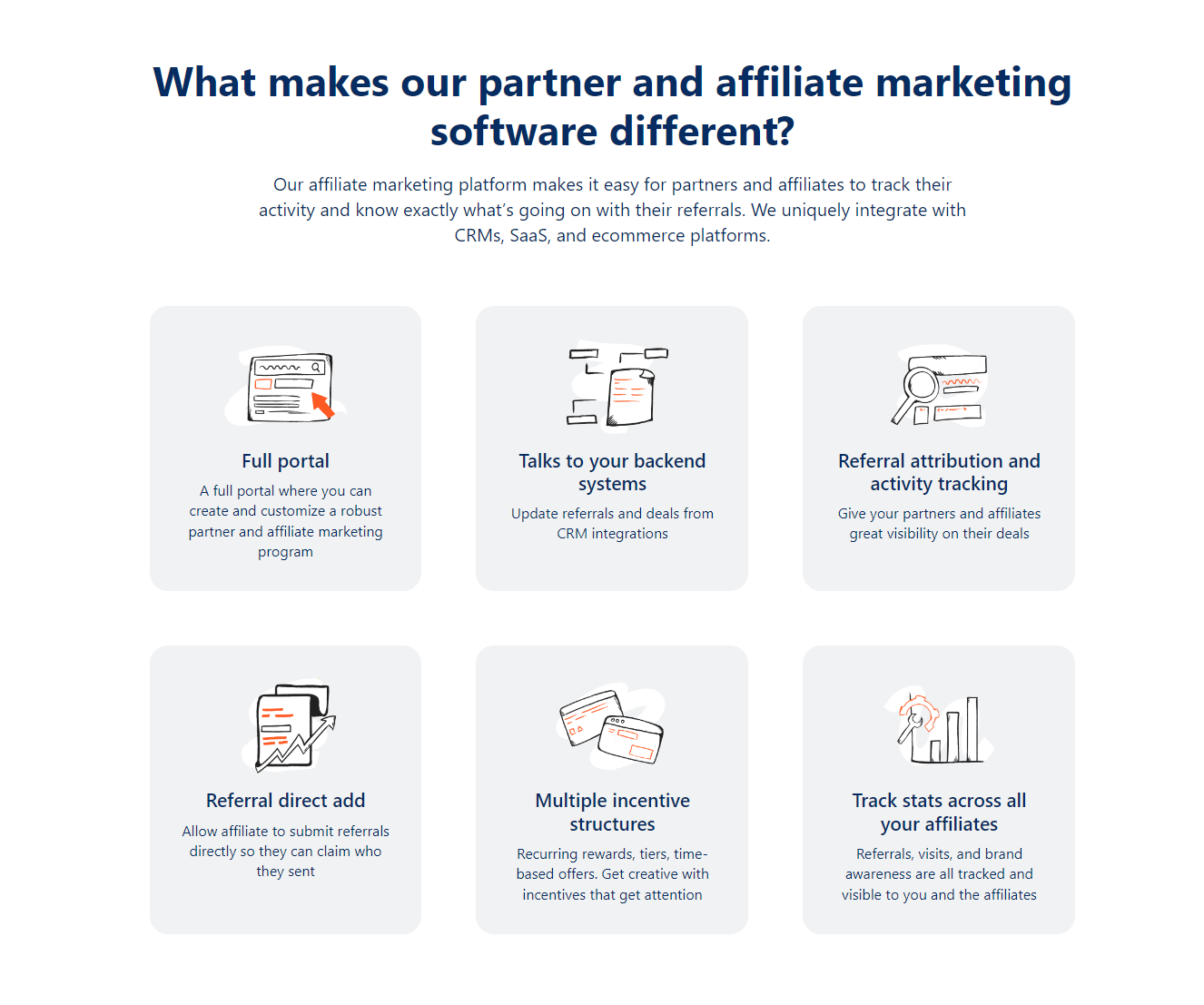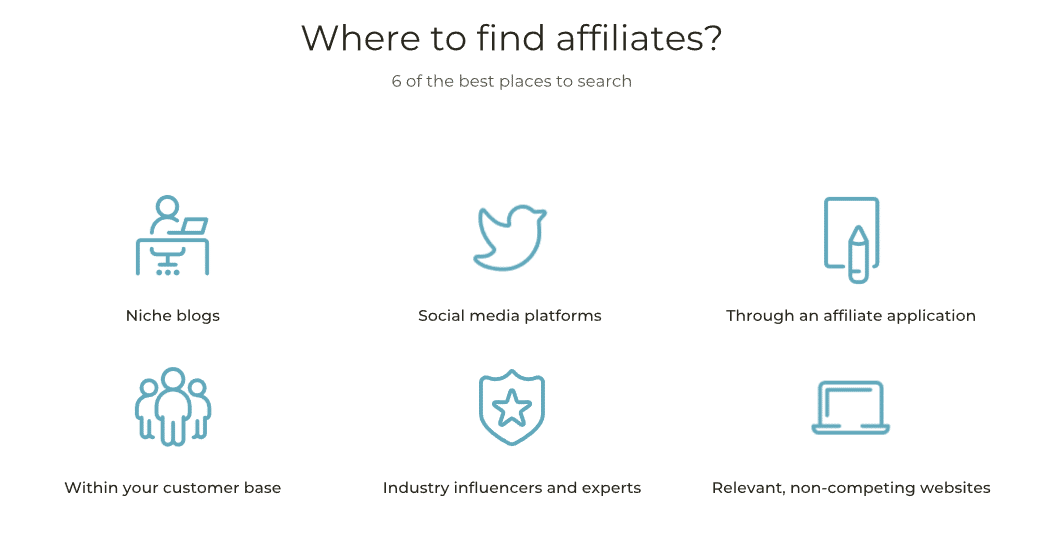Many companies use an affiliate network to set up their affiliate program. These networks connect brands with affiliates and handle commission payouts, but brands end up sacrificing control and customization.
However, there’s another option that gives you a lot more control: Building your own in-house affiliate program. In-house programs let you fully customize the experience. You can nurture more authentic relationships with hand-picked affiliates, track your program in detail, and avoid paying hefty network fees.
This comprehensive guide will walk you through everything you need to know to run a successful in-house affiliate program.
What is an in-house affiliate program?
An in-house affiliate program is one that you create and fully own yourself. You build it using affiliate software rather than going through a third-party affiliate network. It’s called an “in-house” program because your company handles everything involved in managing it. You directly find, vet, and communicate with new affiliates yourself.
With an in-house program, no “middleman” stands between your business and your affiliates. You have the flexibility to shape the program exactly as you wish, and aren’t bound to a network’s rules.
While affiliate networks handle finding affiliates and host affiliate programs for brands, an in-house program gives you more control. Although in-house affiliate programs require you to find your own affiliates, they give you the freedom and flexibility to run the program how you want.
Advantages of in-house affiliate programs
In-house affiliate programs provide several key advantages over network-based programs:
You have more control and flexibility
The main benefit of in-house affiliate programs is that you fully own the program. So, you can customize it to match your specific business goals and needs. Since you build and manage the program through software, you have the liberty to shape it however you want. You make all the rules and policies.
For example, you can create any commission structure that aligns with your objectives, including:
- A tiered payment structure that pays influencers higher commission rates when they reach certain lifetime sales volumes.
- A bonus system that rewards top performers.
- A gamified program with contests and prizes.
- Any other creative structure you want.
With a network, you are limited to whatever options they provide. But in-house, you have endless flexibility.
You can recruit any affiliates you want
Running an in-house program means you must proactively search for and recruit affiliates yourself. But this extra work of finding affiliates enables you to be highly selective. You can hand-pick the best affiliate partners rather than being stuck with a network’s pre-approved members.
For instance, it’s easier to select and reach out to affiliates who have used your product before, and who have a genuine love for your product. You can directly recruit social media creators or bloggers who already know and love your brand, and who are already mentioning you positively in their content.
By hand-picking affiliates who love your brand, you can nurture more authentic advocates who promote you with genuine brand love, and who aren’t just motivated by the prospect of earning money. Getting brand advocates on board, not just promoters chasing commissions, helps nurture more authentic recommendations.
Meanwhile, networks only connect you to their existing members – you can only recruit affiliates who are already registered with the network. If you’re using a network and your ideal affiliates aren’t already part of that network, you’re out of luck. Any non-network affiliates you’d want to recruit would become the network’s property, meaning these affiliates could end up finding and joining a competing program. But with an in-house program, you can recruit anyone.
That means, with an in-house affiliate program, you can access key types of affiliates that you can’t reach via a network.
Affiliate networks tend to appeal to high-level bloggers who reach wider audiences. These affiliates might not be the best fit for you, especially if your business is more niche.
Non-competing businesses make great affiliate partners for many companies, especially smaller-niche businesses. And you won’t be able to recruit these partners on a network, so you’re potentially missing out on the best source of leads if you go the network route. With an in-house affiliate program, you can leverage those relationships with people who already know your business to gain more leads and sales.
You own your affiliate data
You fully control the data and analytics when you run an affiliate program in-house. The software you choose provides detailed tracking and reporting about your program’s performance.
This complete visibility into the metrics that matter helps you make smarter, data-driven decisions about optimizing your program. You see exactly what’s working well and what needs tweaking.
With an in-house program, you’ll also see exactly how individual affiliates are performing, and have the ability to provide affiliates access to their personalized performance dashboards. That way, both you and they can track their individual progress and success.
In contrast, an affiliate network owns all the data when you run a program through its platform. Networks often withhold data points you’d need to fully optimize your program, and you only get basic, high-level reports on your program overall. This limits your ability to dig deeper into the numbers and make informed program decisions.
You can build strong affiliate relationships
In-house affiliates are yours: You own your relationship with your affiliates, and you get to communicate with them directly, through whatever channels you want, and as often as you want.
For instance, you could:
- Send personalized emails checking in.
- Host monthly video calls to provide training and share updates.
- Create a private online community.
The deep connections you can build with in-house affiliates makes their word-of-mouth recommendations feel authentic and sincere. Thus, with an in-house program, you have the opportunity to turn affiliates into genuine brand advocates. Also, you’re able to keep affiliates engaged more effectively, thanks to the relationship you build and the fact your program is presented alone.
However, when you run a program through a network, the network itself owns the affiliates. Affiliates on networks often promote several brands simultaneously, so brands must share these affiliates with multiple programs at once.
In fact, networks benefit when affiliates divide their time between multiple programs, as the networks earn more money the more programs their affiliates join. So, it’s difficult to nurture direct, personal relationships.
Many affiliates join networks just to find the best passive income opportunities, and not to build a strong, lasting relationship with a brand. This transactional dynamic makes it tough to cultivate brand loyalty. And since a brand’s own communication with affiliates on networks is limited, it’s difficult for a brand to build relationships with the affiliates
You aren’t directly competing against other programs
With an in-house affiliate program, you stand alone. Affiliates must join your program directly, not choose it haphazardly out of dozens of options. That means you can shape your commission structure and incentives based on what works for your online business goals and budget—no pressure to match or beat others.
On a network, affiliates can easily see and compare multiple competing programs in your niche. They cherry-pick the ones with the highest payouts or prizes, even if they may not be the best fit. And since network affiliates can only realistically promote a given number of brands, competition is tight. You might even lose an affiliate to a competitor with a better offer, since affiliates belong to the network and not to your brand.
This tends to disadvantage smaller brands who can’t afford sky-high commissions in an “arms race” versus larger competitors on the same network.
In-house programs are more cost-effective
By owning your affiliate program in-house, the only costs are the flat software fee and different affiliate commissions on sales. You pay zero ongoing fees or revenue shares to a network.
Networks often charge hefty fees in addition to what you pay affiliates. Some networks will take upwards of 20-30% revenue share from all sales your program generates.
When you run a program in-house, you keep these extra profits while retaining full control.
How to run an in-house affiliate program
As you can see, the benefits of running your own affiliate program are just too good to ignore. If you decide to build an in-house affiliate program, follow these steps:
Choose the right affiliate marketing software
The foundation for your entire program is the software you use to manage it. Take time upfront to assess your options and select the right platform.
Look for software that:
- Makes setting up a full-featured program as easy as possible, with no coding or developer needed.
- Includes robust affiliate tracking and data reporting features, with all the insights you need to optimize.
- Automates all the complex processes involved in managing affiliates, such as application review, onboarding, payouts, coupon issuing, and more.
- Focuses on facilitating authentic relationships between brands and affiliates – not just transactional partnerships.
- Works seamlessly with multi-step sales processes, with advanced attribution so you can pay commissions accurately.
- Integrates smoothly with your tech stack, including your CRM, email, analytics, and other digital marketing tools.
- Provides exceptional customer service and one-on-one support to help you succeed.
Referral Rock affiliate software offers easy setup (no developer skills needed!), plug-and-play integrations, and a stellar team of onboarding specialists.
Select commissions strategically
Even though you won’t be competing directly against other affiliate programs, you should still check competitors’ commissions and set a competitive rate. Conduct competitive research to see what affiliate commission rates competitors offer. Use this info to set a baseline.
But don’t just match the market. Consider your profit margins and business goals to set rates that are sustainable in the long term. Make sure your brand can afford to consistently pay the commissions on every sale – you’ve got this flexibility since other programs aren’t positioned right by yours.
Since your program won’t compete head-to-head with others, you have leeway to shape rates to your needs. Consider specialized commission structures that incentivize affiliates’ behaviors and activities you want to encourage. For instance, you might try a tiered structure. where affiliates start earning higher commissions when they make a certain amount of lifetime sales. Just ensure it ultimately drives your desired outcomes.
Find the best affiliates
A key advantage of in-house programs is meticulously hand-picking your partners. Take time to find the best affiliates.
Start by searching for creators who already mention your brand positively online. They have an existing relationship with you. Look for ones who create content for an audience similar to yours, and who share your brand’s values and voice. Prioritize quality over quantity.
- Use brand mention software to find creators who are already talking about you.
- Or, open an application and ask why applicants want to be your affiliates.
- You can also directly reach out to existing customers you know create content.
Take advantage of the flexibility to be selective and recruit affiliates who will authentically advocate for you, not just add you to their promotion roster.
Communicate well with affiliates
Once affiliates join your program, set the relationship up for success with frequent, transparent communication.
Create a written agreement detailing your expectations, policies, and guidelines. Leave no room for confusion. Train affiliates on requirements for properly promoting your brand and products. Set clear expectations.
You should also check in regularly via calls, emails, an online community, or in-person meetings. Make face time a priority. Ask for their feedback on the program. Keep affiliates looped in on company news, product launches, special promotions, or changes to the program (including commission changes). Make them feel like true partners.
It all boils down to building an open line of communication. Make yourself available to answer questions and address concerns quickly, whether that’s via email, phone, or a feedback form..
Track your affiliates’ ROI
Your affiliate software should provide a centralized dashboard to monitor key affiliate program metrics.
Pay close attention to KPIs like:
- Signups
- Conversion rates
- Clicks/impressions
- Leads generated
- Sales closed
- Revenue driven
- Return on investment
Analyze this data regularly to determine what’s working well and what needs optimization with your program.
Use the insights to keep improving the experience for both affiliates and your ecommerce business.
Start your own in-house affiliate program today
In-house affiliate programs enable you to customize and control your program fully. With the right software, you can easily create one tailored to your brand’s needs.
If you’re ready to level up your marketing efforts and start your own in-house affiliate program, Referral Rock makes it easy. Our powerful software handles every aspect of managing an in-house program end-to-end, from applicant tracking to automated commission payouts and more.
We even provide one-on-one guidance to help you succeed. Book a demo to learn more about how our software can help you take your affiliate program in-house.







